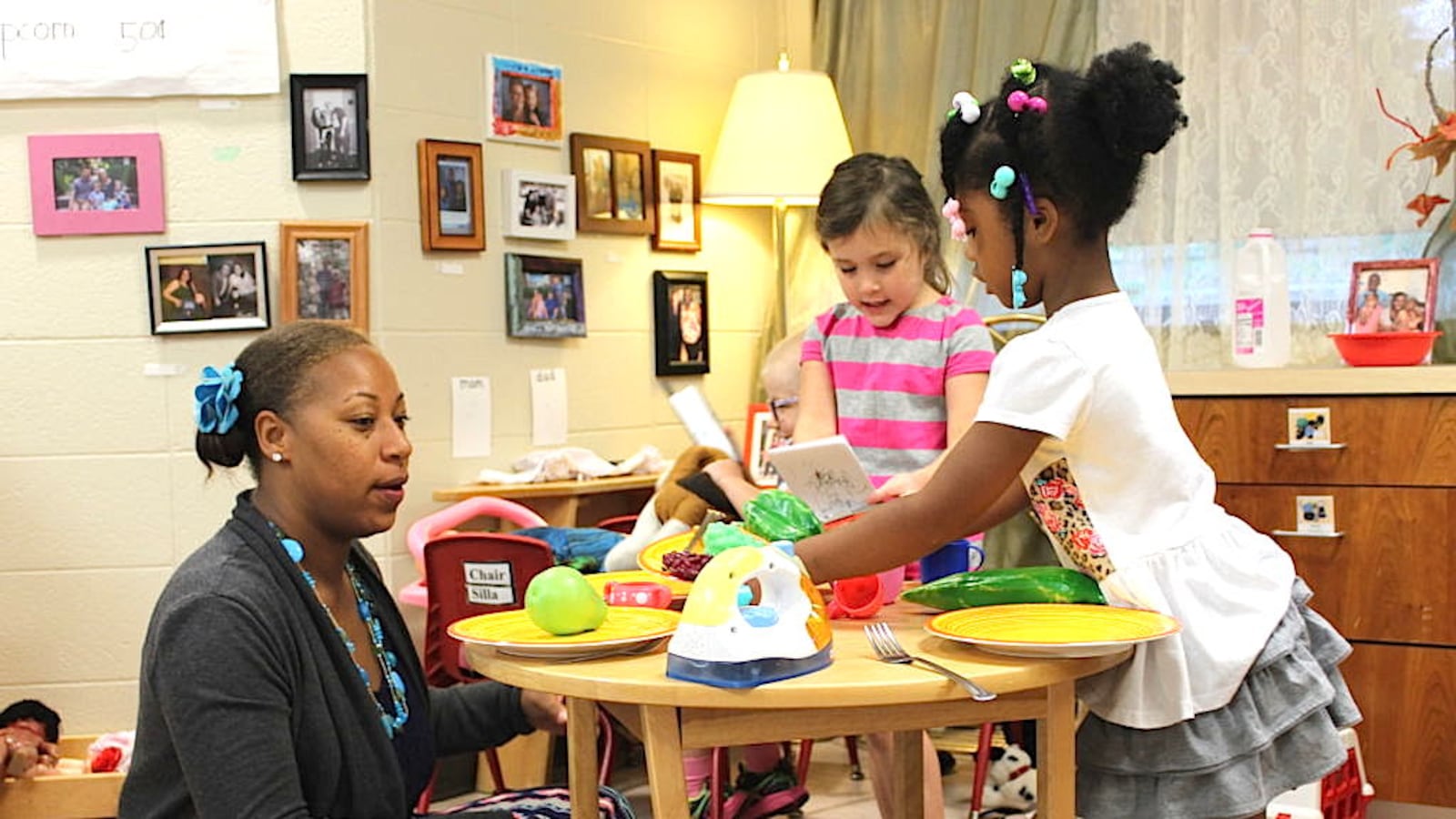The achievement gap between low-income and high-income kids is a pernicious problem in American education — often illustrated by gloomy charts showing wide gulfs in achievement between students from different demographic groups.
But the problem runs deeper than lagging math and reading skills, says a Minnesota-based researcher who visited Denver on Tuesday for an annual lecture hosted by the University of Denver’s Marsico Institute for Early Learning and Literacy.
It starts with a different set of skills — things like self-control and concentration — known collectively as executive function, said Stephanie Carlson, a professor at the University of Minnesota’s Institute of Child Development.
Chalkbeat sat down with Carlson after lunch on Tuesday to talk about why executive function is so important, what happens when young children struggle with it and how parents, educators and policy-makers can help them. This interview has been edited for length and clarity.

How did you get into research focused on young children?
I was in fifth grade and I happened to pick up this book called “Dibs in Search of Self” by Virginia Axline. It was about play therapy with a boy with what today would be called Asperger’s Syndrome. It was a case study. I read it and I never looked back. I said, “That’s what I want to do. I want to do play therapy with kids.” Now, I study play as part of this executive function stuff.
Can you give me a one sentence definition of executive function?
Executive function refers to the brain-based skills that make it possible for us to pay attention, remember our goals, control our impulses, to delay gratification and to think flexibly.
What does executive function have to do with the achievement gap?
Difficulties with executive function really set kids up to fail in school. We also have learned that children growing up in poverty have poor executive function skills. You put these two things together and you have children (who are) unlikely to do well at school because they’re not arriving with these foundational skills in place.
My students and I look at ways to address executive function deficits in early childhood, especially (for) children in low-income circumstances, as one way to try to address and diminish the achievement gap.
Is this conversation about the role of executive function in the achievement gap happening among superintendents, principals and frontline educators?
More and more it is happening, but there’s a long way to go. It’s not the first thing that comes to mind when people think of the achievement gap and how to address it.
So, by saying, “Well, it’s low reading skills and it’s low math skills,” that’s basically just redefining the problem. What we try to do is look at the underlying and early developing sources of the achievement gap.
Preschool suspension and expulsion has been a hot topic recently in Colorado. What are the implications of your research for this topic?
Common sense would suggest and I believe research would support that exclusionary discipline is not very effective. When you exclude children from the environment that you’re trying to teach them to be better adapted to, you’re not giving them any opportunity to learn new skills and practice them in that environment. In fact, if anything (you’re) probably making it worse.
I don’t know the extent to which this could happen overnight in Colorado or anywhere else, but (it would help for educators to understand), these are not character problems. They’re not even necessarily severe developmental delays. These are immature executive function skills.
In a child care landscape where many providers are poorly paid and may not be able to obtain higher level degrees or additional training, is asking them to adopt best practices based on executive function research an impossible lift?
It might be…I’ve done some collaboration in China and to be a preschool teacher (there) is very revered and it’s relatively well paid. There’s a really strong education and training system for it.
That was fascinating to me. When a society decides that it’s going to take this seriously and prioritize and value these individuals who are interacting with our kids so many hours a day, that could go a long way toward changing this and having the staff be better prepared to absorb the research and use it.
It’s paternalistic to devalue women’s work and that’s what child care still is treated as in the U.S.
What can parents do to help their kids develop executive function?
First things first. Are you providing adequate nutrition, a feeling of safety and security? Are there routines where the environment is somewhat predictable?
Beyond that, when you’re trying to teach your child something or help them perform a task that might be a little bit above the child’s current ability, use this “autonomy supportive” caregiving style. So, that’s where you are not controlling the situation too much, interfering and saying, “You’re taking too long. Let me do this.” Other parents will be laissez-faire, where they might be on their cell phone and letting their child do it completely on his or her own, not picking up on the cues from the child that they need more help.
Then parenting (that supports autonomy) is sort of in between — I mentioned Goldilocks parenting — getting it just right, with just the right amount of support that helps the child feel autonomous: “I did it. My actions matter.”
What are some other suggestions for parents and caregivers?
Talking out loud about your own thought process… Say, you’re a teacher in the classroom and you make a mistake — you’re trying to open the supply closet in the classroom and you’re using your house key. Then you’re like “Oh, I was on autopilot for a second there. I use my house key so many times a day, but I’m in school now. I need to choose this other key instead.”
When you talk about your mistake out loud, you can model for kids how they could start to talk to themselves — at first out loud but then ultimately in their head — to think through errors and reflect on them.
Then play, and particularly pretend play. Helping children imagine themselves being someone else, in a different setting, needing to solve different problems. Like, “Let’s pretend we’re on Planet Opposite,” where everything is backwards. Everybody walks on their hands and the sun comes up at night. That helps children think more flexibly.
You mentioned sleep as a key factor in executive function. Is it mainly about children getting enough sleep?
In infancy, it’s not the total number of hours, it’s the consolidation of sleep, particularly nighttime sleep. Those infants who had longer stretches of consolidated sleep at night went on to have better executive function skills that carried with them through school entry. We don’t know exactly why that is.
It could be that their self-regulation for sleep was also good earlier in life. But there are a whole lot of other factors that go into sleep, such as family routines. If it’s a family where it’s a little more chaotic, a little more stressful and there’s a lot more variability in bedtimes, that will affect things like sleep consolidation.
What preschool curriculums or approaches are best for helping kids develop executive function?
Common denominators are that they are play-based and somehow encourage reflection. Play-based curricula like Tools of the Mind…embed language and play in ways that, if done well, can foster reflection. The Montessori approach is another one. The basic premise is to foster reflection in almost everything they do. To help kids be more reflective and intentional about their actions, holding in mind what their goal is.
If you could make one policy change that takes into account the research on executive function, what would it be?
If we could spread the word and help policy-makers, educators and funders really believe these skills matter, at least as much as early reading and early math, I would be very happy. If you imagine a nation with a generation of children who had not learned how to read, that’s how serious it is to not have good executive function skills.
Has the executive function of American children gotten worse over the years?
The socioeconomic differences have always been there… But expectations have changed too, for kids to be able to sit still at a much younger age than was asked of them in the past. So, it’s not the case that children today on average have worse executive function skills than they did 50 years ago.
Any last thoughts?
I would like to encourage educators and parents to get involved in these issues. There’s no powerless figure: “There’s nothing I can do for my class or for my child that’s going to make any difference.” You really can and it’s a collective form of empowerment.

